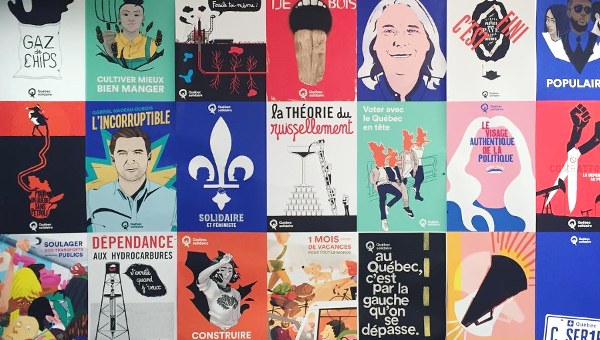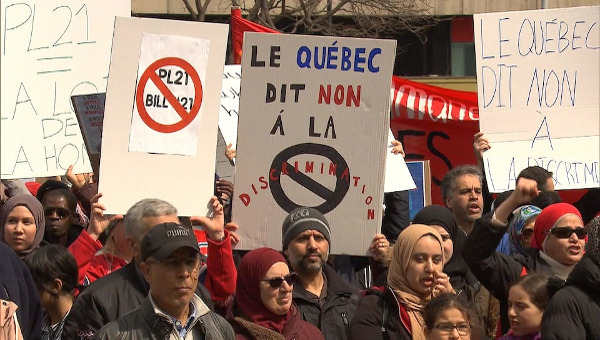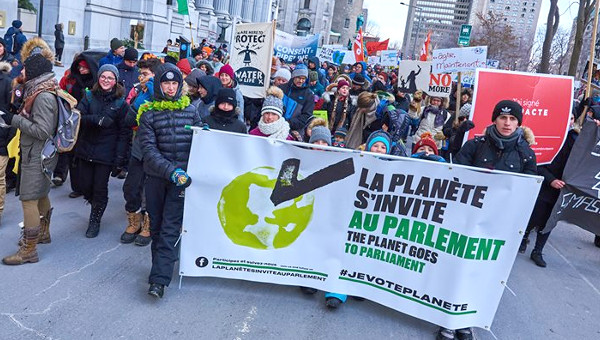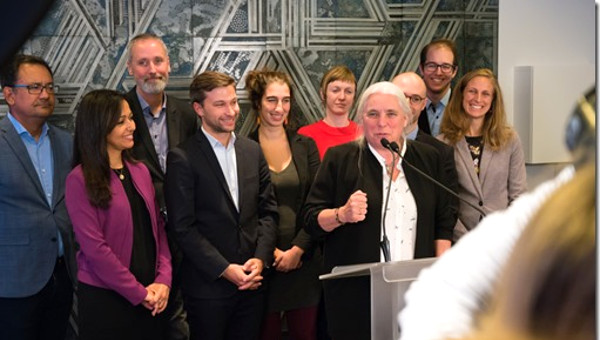Québec Solidaire Congress: A Few Skirmishes, But Shift Right?
Congress focuses on completing fusion with Option nationale
In the fusion agreement with Option nationale (ON) adopted at its previous congress, in December 2017, Québec solidaire committed to aligning its program with that of ON. This was the major objective of the unified party’s congress that met in the Montréal suburb of Longueuil on November 15-17. Also on the agenda, in addition to the usual internal elections and some organizational details, was adoption of the party program on “defense and national security,” left over from the QS congress in May 2017, and some “clarifications on ecotaxation” (écofiscalité), the latter item being proposed by the QS national council meeting last March.
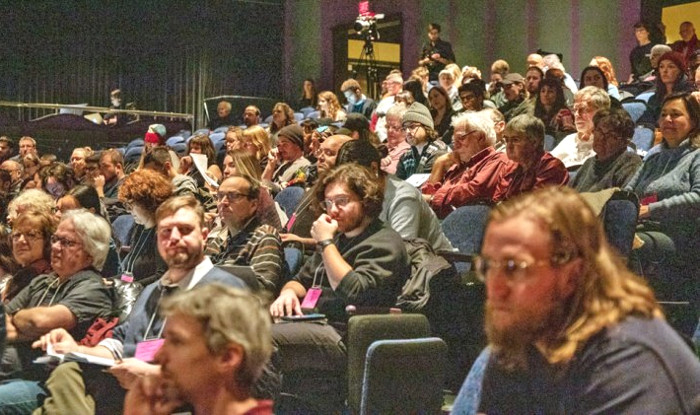
While the 600 delegates did adopt the key provisions of the ON program proposed for adoption, the congress was traversed by an undercurrent of dissent expressed in attempts by delegates to assert control over the party’s 10-member parliamentary caucus and its leadership bodies as well as to reorient the party’s direction on some important questions, in particular with regard to the climate emergency.
The congress also adopted an emergency resolution on the coup d’état in Bolivia, appended below.
Toward a ‘Referendum Election’?
Option nationale originated as a split from the Parti québécois in protest against the PQ’s reluctance to campaign for Quebec independence. In the belief that an independent Quebec should be “neither left nor right” and that no Quebec party “actively” promoted sovereignty, former PQ deputy Jean-Martin Aussant founded ON in September 2011.1 Under the fusion agreement, Option nationale now functions as one of QS’s recognized “collectives,” albeit with unique privileges.
The “Transition to independence” resolution, as adopted with amendments by this QS congress, closely resembles the ON program’s commitment to begin implementing the program of an independent Quebec once elected to office, even before adoption of a new constitution drafted by the constituent assembly.2 The QS resolution provides that a Québec solidaire government, upon being elected, will draft and adopt a transitional framework law under which it may retain or amend any existing federal law to ensure it corresponds more closely to Quebec society, “reaffirming thereby the democratic legitimacy of our only national parliament.” (All quotations are my translation.)
A QS government will also ensure that all taxes and federal payments on Quebec territory will now be collected by the Quebec government before any distribution of funds to another jurisdiction in accordance with respective responsibilities recognized by the Quebec government. All international treaties involving Quebec will be signed by Quebec subject to the right to renegotiate or withdraw from them as needed.
Pending the results of the constituent assembly deliberations, Quebec will begin operating under a republican system of government; the position of lieutenant-governor and the oath of allegiance to the Queen will be abolished.
The framework law will provide for negotiations with the First Nations and Inuit people, guaranteeing “their right to self-determination during the process of accession to independence.” Pending the results of these negotiations, Quebec will claim the continuity of its existing territory. It will integrate Québécois now employed in the federal public service into the Quebec public service if they so wish. Any permanent resident or temporary immigrant residing in Quebec upon its accession to independence will retain his or her status, and processing of their applications for citizenship will be speeded up.
The congress adopted as well an amendment to the draft resolution providing that a QS government must work to create a strong relationship with the popular movements and to rally the continental left to strengthen the constituent process.
Many Questions Remain
In a statement issued following the congress, QS spokesman Gabriel Nadeau-Dubois said “Once we are in power, we will carry out acts of rupture with the federal regime.” As an example, he said a QS government will refuse to allow new oil or gas pipelines to traverse Quebec.
“The adoption of these transitional measures,” writes Bernard Rioux in Presse-toi à gauche, “demonstrates the determination of a QS government to embark on the road to independence beginning with its initial mandate… It is an election that will have given it the mandate to launch the process.”
“[T]he transition might be defined as a situation in which Quebec is no long under total domination of the federal state and not yet really independent.”
However, Rioux warns,
“As history shows, the Canadian state is not going to accept independence through a ‘cold’ process. The members of the Canadian ruling class are not going to behave as great democrats respectful of the expression of the political will of the Quebec people, and they will do everything to attempt to undermine Quebec’s right of self-determination, a right they have never recognized.
“The only response, in this situation, is the strength of the mobilization and determination of the majority of the Quebec population, which alone will make it possible to accede to independence. The forms of actions and organization that will make this possible beyond a simple vote are essential questions that we cannot evade.”
Among the questions that Québec solidaire must address, he says, are:
- The role of Canadian and US imperialism and the need to avoid any illusion as to their readiness to accept Quebec independence. This raises the issue of the alliances we need to forge with the oppressed nations and working and popular classes in both countries to help overcome our isolation.
- In this context, it is illusory to rely on a Quebec army (an indirect reference to the Option nationale collective’s proposal in the pre-congress debate calling for formation of a Quebec army to defend a sovereign Quebec against US intervention).
- How can we confront the probable blackmail of the Bank of Canada during the transitional period? Rioux cites the way in which the European Union used the common currency, the Euro, to strangle the program of Greece’s Syriza government. And what about the pressure that will be exerted by the banks, big business, and “the technocratic summits in the state apparatus” to frustrate the transition?
- How can we challenge the legitimacy of the federalist elites who still traverse Quebec society?
These are among the many essential debates that remain before us, says Rioux.
It is worth noting that these are among the topics scheduled to be addressed in the debates at the conference on “The Great Transition” to be held next May 21-24 in Montréal.
A Québec Army?
The previous programmatic congress of QS in 2017 had left for further debate and decision the issue of whether a proposed national civil defense force should include a military component. To prepare the debate at this year’s congress, the QS policy commission prepared a draft resolution that included many provisions already in some form in the QS program3 but put two different options concerning the defense of an independent Quebec: a “strictly non-violent defense” (Option A) and a “hybrid defense including a military component.”4
“Both options,” said the commission, “are compatible with what was previously adopted. Neither advances a defense model that would be a simple extension of the one currently applied in Canada, with its massive spending on military equipment, a numerous professional army and a close alliance with the United States.
“Option B evokes situations like those of Switzerland, Ireland or Iceland, which have an army that is not part of NATO and never leaves their territory (except in UN operations).
“Option A rejects the idea of an armed force, and relies on a strategy of conflict prevention, reduction of vulnerabilities and non-violent mobilization of the population. This orientation draws on the experience of the mass resistance movements against dictatorships, segregation systems or foreign occupations.”
Option A linked the question of national security and defense to “the nature of the state that the Constituent Assembly will want to establish… “From the outset, the constitution of an independent Quebec involves a rupture with the Canadian confederation as an imperialist state, a junior one as it may be. With a centralized professional army, Canada is integrated with the hegemonic domination of the United States.”
The party’s policy must address the concrete threats and the multiple forms they present today. In the interests of immediate mobilization, and to lead successfully the transition to a new state, we will have to count on a massive citizens’ mobilization. “Non-violent civil resistance thus constitutes, beginning now and throughout this transition, a major strategic advantage in the defence of the process we will be implementing…
“Among the many forms of aggression and destabilization are food, economic, financial, energy, social and/or ecological aggression. Non-violent civil defense aims to counter any threat in a prepared and organized way through peaceful collective actions of non-cooperation and non-confrontation with the adversary. The goal is to place that adversary in a situation in which it is unable to achieve its objectives and to make our society politically uncontrollable, ideologically unsubdued, economically unworkable. The goal is to dissuade by making the cost of aggression greater than the hoped-for gain…
“With the climate threat, decentralization of state power to the benefit of citizen bodies is essential. So also with security and defense policy.”
Option B proposed the creation of a force that would be both military and civilian. The military component would be armed and would intervene in the event of foreign invasion. It was needed for protection of the immense territory of Quebec, its resources and its strategic infrastructures. It would serve outside Quebec territory only in exceptional circumstances, democratically decided. The civilian component would be specialized in non-violent resistance techniques, and could as well be “deployed abroad in international solidarity missions.”
The military component, according to Option B, is a prerequisite to an anti-imperialist policy. “Some countries that have no military forces, like Costa Rica and Iceland, subcontract their defense to the United States and participate thereby in NATO, an aggressive military alliance.”
We need to bear in mind that Canada is “a colonial state that has no interest in Quebec becoming independent and has not hesitated to intervene in it on several occasions. Nor should be forget that the society we want proposes a rupture with the present neoliberal and petro-state… [A] QS government must be able to achieve that society despite possible imperialist military threats.”
It seems there was little internal debate on these options prior to the congress, perhaps because the membership thought they had been defined and explained adequately by the policy commission. The synthesis resolution debated at congress incorporated a few proposed amendments to both options. A third option, C, proposed by the policy commission itself, called for “gradual implementation of a defense without an army” pending “full recognition of Quebec independence by the international community.” It was rejected, and in the end Option B was adopted overwhelmingly with no major amendments.
Climate Change
The third and last major programmatic item on the agenda, “ecotaxation,” resulted in overturn of the Québec solidaire program’s opposition to market approaches based on carbon taxes and Quebec’s existing cap-and-trade program. The retreat had begun during the 2018 election, when – in the middle of the campaign – the QS leadership presented a climate-change platform that promised a QS government would retain cap-and-trade during its first mandate and establish a carbon-tax that would be set at $110 a ton by 2030 – far below any amount that could help to limit greenhouse gas (GHG) emissions to 48% of 1990 levels by 2030, as promised by QS. That platform, Now or Never, was never debated in the membership.5
A proposal that (inter alia) would end subsidies to fossil energy industries and impose much greater taxes on banks, big business and large private fortunes, the resulting revenues to be applied exclusively to fighting climate change, as well as to “replace the carbon market by regulatory limits on GHG emissions of polluting industries and provide for mandatory and rapid declines on those levels” was defeated by delegates.
In its place the adopted resolution, in addition to eliminating the QS program’s rejection of market-based mechanisms, paralleled the federal government’s existing carbon-tax program with rebate of the tax payments to lower-income citizens. However, it would apply the tax to all GHG emissions, whatever the source. The gradual implementation of this system would depend on “the availability of alternative options generating fewer GHGs.”
Carbon taxes are designed to alter consumer behaviour by increasing public awareness of the dangers in existing and rising GHG emissions. However, since capitalist politicians fear the adverse political effects of such taxes they are usually kept to ridiculously low amounts and are usually accompanied by provisions to rebate the proceeds, in whole or in part, to lower-income taxpayers. In the case of the federal Trudeau government’s tax, the amount rebated actually exceeds the amount collected from this sector of the population – thus defeating the promised effect on consumer behaviour!
Despite the QS ecofiscal commission’s argumentation, there is virtually no evidence that carbon market mechanisms result in any qualitative reduction in carbon emissions. Capitalist economists cling to this approach, however, because they are unwilling to contemplate the necessary radical elimination of fossil fuel production with its probable negative impact on profits and “competitiveness.” Yet Québec solidaire fails to name the system that is responsible for the climate catastrophe. Instead, its 2018 election platform blames it on “human activity,” not capitalism.
Again, these are issues that must be debated in QS. Its present program fails lamentably in this regard.
Begging Legault to Tackle Climate Change…
There are related problems, too. The QS parliamentary caucus’s major campaign this past year has been Ultimatum 2020. It demands that the right-wing CAQ government of François Legault “adopt a credible economic transition plan by October 1, 2020,” the half-way point in its current mandate. “That,” says QS, “is the year of the last chance to avoid climate crisis.” Specifically, it calls on the Coalition Avenir Québec government to:
- Prohibit any proposed oil and gas exploitation or exploration on Quebec territory
- Propose a plan to enable Quebec to attain the GHG reduction targets of the international panel of experts on climate change (IPCC)
- Have this plan approved by an expert who is independent of the government.
If the government fails to do this, “Manon Massé and the QS caucus will cease to collaborate and will implement a parliamentary blockade (barrage parlementaire) to force the Legault government to act… Perhaps he will finally understand.”
QS co-spokesman Gabriel Nadeau-Dubois has even published a book entitled “Letter of a deputy who is concerned to a premier who should be.”6
The breathtaking naiveté of this campaign simply boggles the mind. But the QS leadership has focused its primary appeal to the party’s members and supporters to mobilize “to force Legault to get his head out of the sand and assume his responsibilities.” (All quotations are translated from the QS pamphlet introducing the campaign.)
Supporters are urged to form or join teams that are to pursue “concrete” tasks assigned by the party. These tasks, issued every two weeks (there are nine so far) include such things as collecting signatures, organizing public meetings, lobbying CAQ deputies, etc.
And how successful has the campaign been? So far it has collected only 25,000 signatures – about the same number as the QS membership! Within QS, many members are upset.
Although there was no debate on the campaign scheduled at the QS congress, an emergency resolution proposed by six QS associations was adopted almost unanimously calling for the campaign to be “reoriented, in accordance with the requirements of the new situation [a reference to, inter alia, the climate protest demonstration of half a million in Montréal in late September] to put the emphasis on the major priorities of the Québec solidaire transition plan as well as to support, extend and deepen the present mobilization.” An accompanying proposal calling for a debate on the campaign at the congress had been ruled “unreceivable” by the resolutions committee.
Internal Democracy
Another expression at the congress of membership unease with the party leadership’s conduct was the recent attempt by co-spokeswoman Manon Massé and two other QS deputies (Catherine Dorion and Sol Zanetti, both representing Quebec City ridings) to parachute their chosen candidate into the by-election in the riding of Jean-Talon, now scheduled for December 2. The candidate, Frédéric Poitras, until then not a QS member, has worked the last five years as a political advisor to Quebec City mayor Régis Labeaume. The mayor is a strong supporter of the CAQ government’s plan to build a new highway crossing between the north and south shores of the St. Lawrence River, a project opposed by many citizens’ groups with which QS members are actively working. Three other candidates had already announced they would seek the QS nomination in Jean-Talon.
The deputies’ intervention provoked a revolt among the riding’s membership. In the end, party activist Olivier Bolduc was elected the candidate at the nomination meeting, far ahead of Poitras. A leaflet distributed at the congress by the members of the “expanded coordinating committee” of QS Jean-Talon protested:
“This is not the first time the national leadership has acted this way. It is time to put an end to a practice that demobilizes the associations and violates our political values… That is why the principle that candidates are chosen by the local associations is embedded in our statutes… The support of members of our parliamentary wing to the candidacy of someone outside our party has profoundly shocked us.”
No doubt with this scandal in mind, the QS executive decided, shortly before the congress met, to open an internal consultation on the party’s democratic functioning and statutes, and “to draw up an inventory of possible solutions to these problems.” A table was set up in a separate room at the congress to hear some initial submissions by members. A preliminary report will be debated at the QS national committee meeting next May.
The “consultation” committee may also be called on to address the “updating of the modalities of recognition and continuity” of the party’s collectives, as proposed by the national coordinating committee last April. At present the party has nine collectives. With the exception of Option nationale, which has special rights under the 2017 fusion accord, most have a low profile and simply group QS members with a particular interest (e.g. animal justice). However, there is a pending request from some members to remove recognition from the collectif Laïcité (secularism) because it has publicly criticized the QS opposition to the government’s Bill 21 denying the right of public employees to wear symbols of their religious belief.
Another exception is the International Marxist Tendency (TMI) collective. In past congresses, TMI members have been content to maintain a book stall and to lurk in the corridors selling their journal La Riposte (Fightback). In this congress, however, TMI members intervened vocally in several debates, their delegates ostentatiously flashing copies of their journal while they spoke. In the ecotaxation debate, they sought unsuccessfully to have the congress overrule the policy commission’s exclusion from consideration of proposals from two QS associations expressing the TMI hope (as they put it in an accompanying leaflet) that Québec solidaire would agree that “nationalization of the major sectors of the economy is the only real immediate solution to the climate crisis.” (The policy commission had ruled this went beyond the agenda of the congress.)
Personally, I have little sympathy for the ultimatist tone and content of the TMI message, which displays little awareness of the transitional program advanced by other international tendencies of similar (Trotskyist) antecedents. And I disagree with the views of the Laïcité collective, which seems to misunderstand the distinction between individual belief and state neutrality in religious matters. However, I believe that the quality of debate within Québec solidaire might benefit if the party’s collectives, and the membership generally, were given an expanded role in contributing to internal debate and decision-making.
This congress illustrated once again, as have so many other QS congresses in the past, an underlying problem in the way programmatic debates are organized in the party. I think Pierre Mouterde puts it well in a post-congress article.7 The practice, he writes,
“organized essentially – as tradition has it in the unions, which has served as the model – around a string of amendments and sub-amendments proposed by the different associations… ends up making the debates extremely onerous, complex and frustrating for all the delegates (and I was one). To the point that many no longer really grasp the meaning of what they must ultimately vote on, and above all are no longer able to debate the essential (the major orientations at stake) and subsequently decide. Which tends to make this exercise … particularly sterile, since it does not help us get to the bottom, to deepen our own political vision, to politicize ourselves collectively and to reinforce this common left culture that ought to be ours.”
A QS predecessor, the Union des forces progressistes (UFP), maintained a moderated on-line forum that allowed members to discuss political ideas and events, and to link to articles of possible interest to other members. This might help the cause of internal democracy within Québec solidaire.
Finally, it is worth noting an important decision taken on the last day of the congress following some intense lobbying by, among others, the QS antiracist decolonial collective. The delegates voted unanimously to establish a National Indigenous Commission (CAN in its French acronym) to give voice to the party’s First Nations and Inuit members. It will be composed only of Indigenous members, and will be mandated initially to define its structures, and to declare its views on the existing party program and any issue “within an inter-sectional perspective” at all levels of the party. It is intended to develop “nation-to-nation relations between QS and the Indigenous peoples’ communities; to support the involvement of Indigenous women; and to convoke if it wishes a national conference of Indigenous peoples to address any issue that it considers relevant.” A member chosen by the committee will sit on the QS national coordinating committee on an interim basis until the party’s 2021 congress. •
Appendix:
Emergency Resolution on Bolivia
Adopted unanimously by delegates at the congress of Québec solidaire, November 16, 2019.
QS Introduction
From a news release issued by the party on November 17. It must be said: What happened last week in Bolivia is a coup d’état. It recalls to us the darkest hours in the history of Latin America.
The great Uruguayan writer Eduardo Galeano wrote in the early 1970s:
“[O]ur region still works as a menial. It continues to exist at the service of others’ needs, as a source and reserve of oil and iron, of copper and meat, of fruit and coffee, the raw materials and foods destined for rich countries which profit more from consuming them than Latin America does from producing them.[…] [I]n close proximity [are] the caravelled conquistadors and the jet-propelled technocrats: Hernan Cortes and the Marines; the agents of the Spanish Crown and the International Monetary Fund missions; the dividends from the slave trade and the profits of General Motors.”8
Sadly, in 2019, this assessment still rings true. The coup in Bolivia was orchestrated by the Bolivian economic elite with the complicity of the Organization of American States (OAS). The OAS is based in Washington and is financed 44 per cent by the United States. It is nothing but the diplomatic arm of US imperialism.
By challenging the electoral results that made outgoing president Evo Morales the victor, the OAS paved the way for the seizure of power by an illegitimate and profoundly regressive government. After the forced resignation of Evo Morales, the whipala, the seven-colour flag of the Indigenous peoples and the second official flag of Bolivia, was removed from the presidential palace and burned. It was an openly racist act.
To denounce this tragic coup against democracy and human rights, the deputy of Laurier-Dorion Andrés Fontecilla, and the delegate of the Verdun QS association Zachary Williams, presented yesterday the following emergency motion to the congress of Québec solidaire:
Whereas:
- The Bolivian president Evo Morales received the majority of the votes in the Bolivian presidential election;9
- President Morales agreed to a second round of election although, under the country’s election law, the majority support he received did not necessitate a second round;
- The coup placed in power an illegitimate government in Bolivia, which has promoted violence against the progressive activities of Bolivians and the indigenous peoples
It is proposed:
- That Québec solidaire formally denounce the coup in Bolivia and the foreign interference through the Organization of American states (OAS);
- That Québec solidaire denounce the far-right violence toward Evo Morales, the progressive and popular movements and the indigenous communities of Bolivia.
Unfortunately, the resolution does not mention Canada’s role in this sordid affair, which closely resembles the Trudeau government’s continued support of Venezuela’s would-be coup leader Juan Guaidó. See “Canada backs coup against Bolivia’s president.”
See also: Statement on Human Rights Violations in Bolivia – An open letter signed by over 850 public figures. •
Endnotes
- He has since rejoined the PQ and was an unsuccessful candidate in the 2018 election.
- See the 2017 program on the ON collective’s website, especially Part I, “Accession to Quebec independence.”
- See in particular pp. 73-74.
- The commission’s draft and its presentation are linked in the Option nationale collective’s text, cited earlier.
- See my summary and critique of the platform.
- Lettre d’un député inquiet à un premier ministre qui devrait l’être, Lux 2019, 104 pages. For a critique see “Lettre de Gabriel Nadeau-Dubois à François Legault: comme tenter de faire pousser une fleur dans le ciment.”
- Pierre Mouterde, “14ième congrès de QS: ne pas lâcher la proie pour l’ombre?,” Presse-toi à gauche, Nov. 19.
- Open Veins of Latin America: Five Centuries of the Pillage of a Continent (Monthly Review Press), translated by Cedric Belfrage, foreword by Isabel Allende. – RF
- Morales received a plurality of the popular vote: 47.08%, just over 10% more than his nearest rival Carlos Mesa, and thus was elected on the first round in accordance with Bolivia’s Constitution of the Plurinational State. – RF


